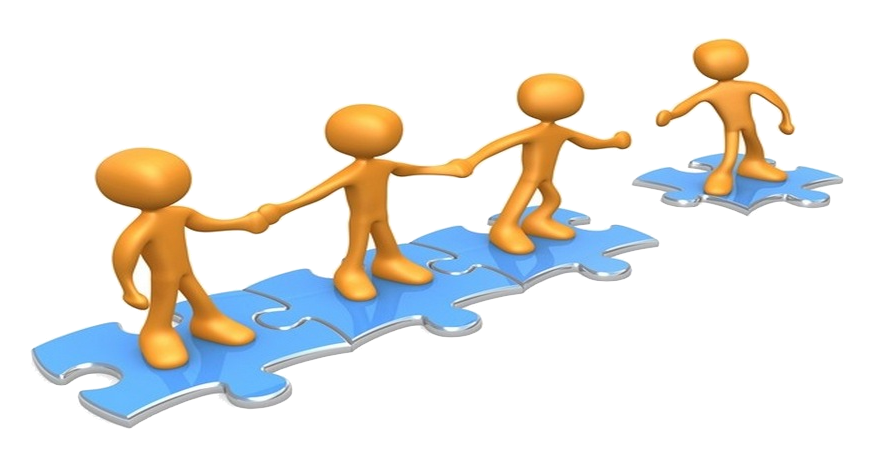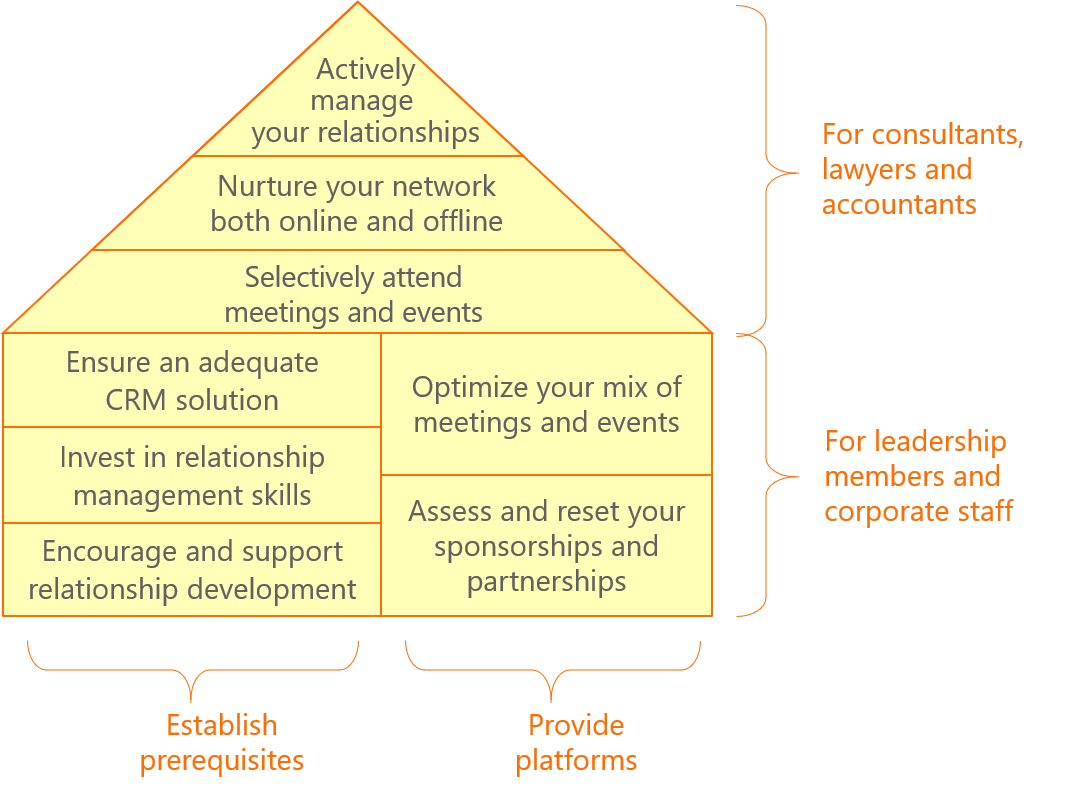Relationships and networking: 5 tips for leadership and marketing

Relationships and networks are critical to the commercial success of accounting, consulting and law firms. That's why this is one of the key growth drivers for professional services firms.
Relationship management at professional services providers, is primarily the responsibility of individual partners and fee earners: it is up to accountants, lawyers, advisers or consultants to build and maintain relationships. See my blog on this: relationship management tips for individual partners and professionals.
This does not alter the fact that the organization, or the office, has a great deal of influence on the extent to which and the success with which individual professionals develop relationships and networks. First of all, by giving substance to the preconditions for effective relationship management. For example, is there a culture in which employees are stimulated and assisted in developing relationships?
In addition, management and marketing can create and offer platforms that help professionals to develop valuable relationships. For example, by organizing seminars or meetings where valuable relationships can be established and developed.
The figure below summarizes the most important tips for individual partners and employees, as well as for management and marketing.

In this blog I discuss 5 tips for administrators and marketers: how can they support individual professionals in the field of relationship management and networking.
Click here for relationship management tips for individual partners and employees.
1 Encourage and facilitate relationship development
You can explain to accountants, lawyers and consultants how and why they should invest in relationships and networks, but if they don't feel supported to get started, it won't work. Both soft and hard aspects are important here.
With 'soft aspects' I mean culture, how people think about colleagues who invest time and energy in relationship development.
Tone from the top and exemplary behavior of managers have a major influence on how internally people think about relationship development and networking.
Who doesn't know the cynical jokes that are often made when a colleague goes to a network meeting in the afternoon? The importance of investing time in relationship development and networking must be shared and supported internally. Starting with the partners, who can then discuss this topic with their teams.
In addition, it is important that in the context of personal annual plans and assessments, agreements are made with partners and employees about their role in relation to relationship development and networking. If such 'hard aspects' are not filled in, relationship development remains a bit of a problem if there is not enough billable work, while you have to maintain and develop relationships and networks on a continuous basis to be successful.
It also helps enormously if someone takes on the responsibility to periodically - for example on a quarterly basis - identify which relevant events (organized by third parties) are coming up, and then determine in consultation where one or more representatives of the own organization. If you link this to a structural evaluation of what participation has yielded, a learning effect quickly arises, which means that priorities can be determined increasingly better. Small offices can coordinate this at the office level, but in larger organizations it is usually more convenient to organize this locally, for example at the level of sector groups or regions.
Invest in knowledge and skills
If the partners and employees are motivated to develop relationships and networks, they must of course be able to do this. Unfortunately, this talent does not come naturally to any advisors, accountants and lawyers .
"Recently, a successful lawyer confidently said that relationship development is not difficult at all, and that fellow lawyers should not nag."
I think this approach is counterproductive. Of course there are commercial leaders, also among accountants and lawyers, but many find this difficult. By not taking their challenges seriously, you only make them more insecure, which is why it does not work.
It is more sensible to recognize that many professionals are by nature more of the content, and therefore need help to develop more successful relationships. For example, by providing a number of 'blue' tools, of which I gave examples in my blog about relationship management by individual professionals. And by having people practice with things like conversation techniques and networking. This can take the form of training and role-playing, but also 'walking along' with colleagues who are relatively skilled can work very well, provided that there is a safe and trusted culture in which people can give each other honest, constructive feedback.
3 Provide a CRM solution
If you, as an organization, invest in people who are motivated - and able - to develop relationships and networks, you are already taking a big step forward commercially.
But in business relations it is also about content: responding to what concerns the other person; know when there are important developments for the other person; know who in the organization has contact with the other person and what has been discussed; know what the other person finds important, and so on.
There are people who remember such things flawlessly, but for most, an adequate CRM solution is indispensable.
In my blog about relationship management by individual professionals I explained how individual employees can manage their relationships in a personal CRM system, or even in a customizable contact spreadsheet.
However, all these solutions, as well as the brilliant colleague who remembers everything, are no longer sufficient if several colleagues are in contact with the same relationship. It is therefore wise to provide an organization-wide CRM solution. This of course not only supports relationship management, but it is also crucial for, for example, coordinating marketing and sales. I will elaborate on this in a blog about 'Leadership structure, systems and processes'. Click here to sign up for blogs.
4 Optimize the mix of meetings
In my blog with relationship management tips for individual professionals, I explained why attending events and meetings is often a sub-optimal way to spend your time. An important reason is that most meetings attract a mix of people who all have their own goals, so that often only a relatively small part is interesting for you.
And that is exactly the power of your own meetings: you can decide who you invite. We all know the famous drinks, which are mainly about fun. Mostly existing, warm relationships come to such meetings. Think of a New Year's drink. In order to develop new relationships, you also have to offer interesting content - in addition to socializing and interaction. In general, small-scale meetings are more effective for relationship development than large events. Think for example of round tables, breakfast seminars or theme meetings.

The quality of the program, the speakers and the participants determine who comes next to things like location (distance, appearance) and times (traffic jam sensitivity, duration). Click here for one checklist for organizing an event.
This blog is about meetings to strengthen relationships and networks. And that is precisely what often goes wrong: a lot of time and money is regularly invested in organizing seminars and congresses, during which the people of the organizing party are chatting together during the congress. While the guests are left to their own devices!
Of course this cannot be the intention. On the other hand, we must also recognize that many professionals find it safer and therefore more pleasant to deal with each other. That is why it is important to make clear agreements in the preparation about everyone's role during the meeting. That is mainly a matter of pre-listing:
- Which guests are coming?
- Who knows which guests, resp. who should (better) get to know which guests?
- Who takes responsibility for which guests?
With regard to the latter, it is of course not the intention that someone sits on top of a guest like a police officer, on the contrary. The point is that for a number of agreed guests, everyone ensures that everything goes well, checks whether there is a need for something, and of course that their own professionals and guests get to speak to each other sufficiently. How the professional deals with existing relationships then determines, of course, whether this also leads to results. Hence the importance of the aforementioned commercial and communication skills.
Follow up
Then there is something else: follow-up! Busy professionals are always masters of getting back into running assignments quickly after a meeting (which in their perception has already cost so many non-billable hours). While the follow-up is crucial for achieving results!
Therefore, ensure that shortly after the meeting is discussed how the acquired contacts are followed up. You probably prefer a follow-up appointment, but small things are often valuable, such as a message about what has been discussed, including an article, research or advice in that area. Or the suggestion to meet a colleague or business associate who knows everything about the topic this relationship was asking about (referral).
This does not have to be difficult; what matters is that it happens. And experience shows that it usually does not happen by itself, so you will have to organize it from marketing or business development, with the support of the board.
5 Review the use of sponsorship and partnerships
An important advantage of organizing meetings and events yourself, such as seminars and round tables, is that you can decide who you invite. The question is then: how do you ensure that the people with whom you want to build relationships come to your meeting? After all, knowledge and information is now widely available via the internet, so content alone is often not enough, especially if your target group consists of decision-makers.
Entering into a partnership with another appropriate, complementary organization or person can enable you to build relationships with people that you would not reach on your own. Consider, for example, a seminar that you organize as a law firm in collaboration with a renowned media partner or research institution. Or a meeting of an accountancy firm in collaboration with, for example, an international authority in the field of doing business in China.

Sponsorship
A special form of cooperation is sponsoring. Sponsor platform defines sponsorship as: 'an investment by a sponsor in a person, club, activity and / or event (sponsored) in exchange for the right to use the association with the sponsored to achieve the (commercial) objectives. ' While partnerships are often entered into by related, non-competing organizations that complement each other, sponsorships often involve very different organizations, events or people, such as a conference, exhibition or sports club.
The latter, sponsoring a sports club in exchange for business seats, for example, is a popular tool for relationship development among business service providers. It takes little imagination to think that if your relationships love football, it can be interesting to invite them to see and experience a great game together.
Assess your mix of partnerships and sponsorships
So partnerships and sponsorships can help build and deepen relationships. That is beautiful. However, the reality is different for many offices: sponsorships in particular are often entered into on few rational grounds.
Quite often, an office sponsors for example the hockey club, only to keep good relationships with a friend or because a director is a fanatic hockey player himself.
It is no exception that, for example, sponsoring a football club in practice does not amount to much more than there are billboards along the field. As well as business seats that remain largely empty in most matches or are occupied by family and friends. In such ways, a lot of marketing budget is wasted.
Therefore, identify all sponsorships and partnerships, and then measure and test how they contribute to the realization of the business objectives. Regarding relationship development, it is important to look specifically at priority relationships, ie the contribution that a partnership or sponsorship makes to strengthening relationships with the most important contacts. Activation options are crucial in this regard. In addition to relationship development, sponsorship objectives can of course also relate to, for example, brand and reputation.
It is very likely that this exercise shows that a significant part of the partnerships and sponsorships can be terminated. This released budget can then (partly) be used for activities that contribute much more strongly to the development of priority relationships, which can significantly improve the return on marketing investments.
Finally
So far my tips for more results from relationships and networks.
Click here to sign up for blogs about marketing, business development and people management in consultancy, law and accountancy.
Do you want to exchange ideas about a more effective approach to relationship management and networks? Take it easy Contact on.

